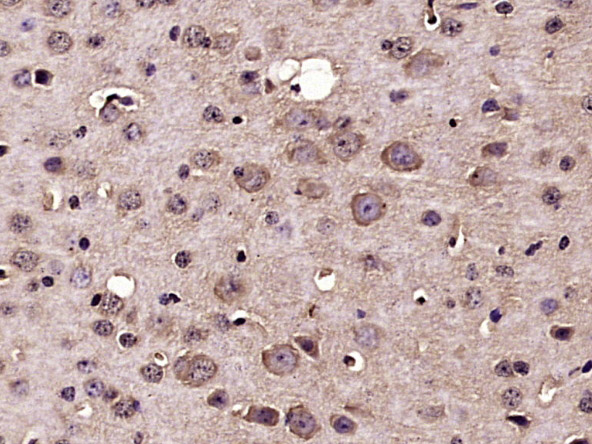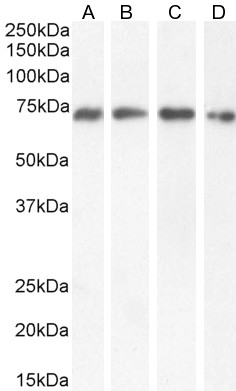Nucleoporin p62 antibody
GTX107973
ApplicationsImmunoFluorescence, ImmunoPrecipitation, Western Blot, ImmunoCytoChemistry, ImmunoHistoChemistry, ImmunoHistoChemistry Paraffin
Product group Antibodies
ReactivityHuman, Mouse, Rat
TargetNUP62
Overview
- SupplierGeneTex
- Product NameNucleoporin p62 antibody
- Delivery Days Customer9
- Application Supplier NoteWB: 1:1000-1:10000. ICC/IF: 1:100-1:1000. IHC-P: 1:100-1:1000. IP: 1:100-1:500. *Optimal dilutions/concentrations should be determined by the researcher.Not tested in other applications.
- ApplicationsImmunoFluorescence, ImmunoPrecipitation, Western Blot, ImmunoCytoChemistry, ImmunoHistoChemistry, ImmunoHistoChemistry Paraffin
- CertificationResearch Use Only
- ClonalityPolyclonal
- Concentration1 mg/ml
- ConjugateUnconjugated
- Gene ID23636
- Target nameNUP62
- Target descriptionnucleoporin 62
- Target synonymsIBSN, SNDI, p62, nuclear pore glycoprotein p62, 62 kDa nucleoporin, nucleoporin 62kD, nucleoporin 62kDa, nucleoporin Nup62
- HostRabbit
- IsotypeIgG
- Protein IDP37198
- Protein NameNuclear pore glycoprotein p62
- Scientific DescriptionThe nuclear pore complex is a massive structure that extends across the nuclear envelope, forming a gateway that regulates the flow of macromolecules between the nucleus and the cytoplasm. Nucleoporins are the main components of the nuclear pore complex in eukaryotic cells. The protein encoded by this gene is a member of the FG-repeat containing nucleoporins and is localized to the nuclear pore central plug. This protein associates with the importin alpha/beta complex which is involved in the import of proteins containing nuclear localization signals. Multiple transcript variants of this gene encode a single protein isoform. [provided by RefSeq]
- ReactivityHuman, Mouse, Rat
- Storage Instruction-20°C or -80°C,2°C to 8°C
- UNSPSC12352203
References
- Wen LL, Chen YT, Lee YG, et al. Perfluorooctane sulfonate induces autophagy-associated apoptosis through oxidative stress and the activation of extracellular signal-regulated kinases in renal tubular cells. PLoS One. 2021,16(1):e0245442. doi: 10.1371/journal.pone.0245442Read this paper
- Rodriguez-Bravo V, Pippa R, Song WM, et al. Nuclear Pores Promote Lethal Prostate Cancer by Increasing POM121-Driven E2F1, MYC, and AR Nuclear Import. Cell. 2018,174(5):1200-1215.e20. doi: 10.1016/j.cell.2018.07.015Read this paper
- Gu Y, Yang Y, Wan B, et al. Inhibition of O-linked N-acetylglucosamine transferase activity in PC12 cells - A molecular mechanism of organophosphate flame retardants developmental neurotoxicity. Biochem Pharmacol. 2018,152:21-33. doi: 10.1016/j.bcp.2018.03.017Read this paper





![ICC/IF analysis of HeLa cells using GTX00696 Nucleoporin p62 antibody [2A11]. Left : Nup62 protein focused on nuclear surface Right : Nup62 protein focused on nuclear rim Dilution : 1:400 Fixation : 4% PFA Permeabilization : 0.5% Triton X-100](https://www.genetex.com/upload/website/prouct_img/normal/GTX00696/GTX00696_20191104_ICC-IF_w_23053121_984.webp)